Shopify – Review
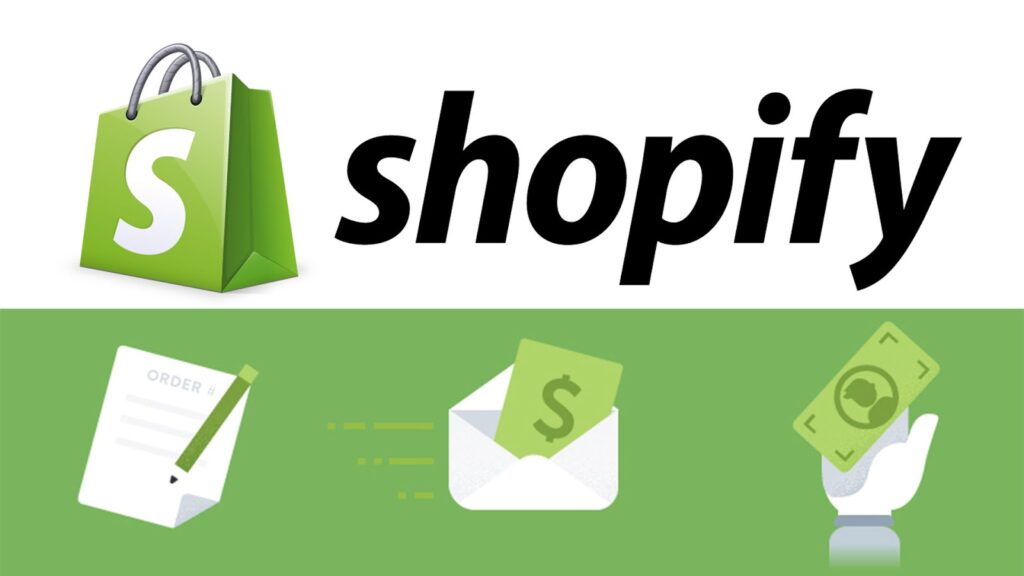
In the ever-evolving digital world, having an online presence is no longer optional but a great necessity. Among the plethora of web hosting services available today, Shopify stands out. This comprehensive review will walk you through all the key aspects of the platform, from what it is and its features, to who it’s for and who it’s not for, pricing, pros and cons, frequently asked questions, and our final say on the product. Whether you are a small business looking to create your first website or an established company wanting to scale up your online operations, this review aims to provide you with all the information you need to make an informed decision. Let’s start!
What is Shopify?
Shopify is a leading e-commerce platform designed to help businesses create their own online stores. It’s a comprehensive solution that offers a variety of services including website building, web hosting, payment gateway integration, and inventory management. By providing a user-friendly interface, and an array of customizable templates, Shopify enables users with little or no coding skills to establish their online presence with ease.
In addition to its core function of creating online stores, Shopify also provides additional features like SEO tools, marketing resources, and analytics to track your website’s performance. These features are instrumental in helping businesses drive traffic to their website, optimize their content for search engines, and analyze customer behavior to make data-driven decisions. It’s a one-stop-shop for all your e-commerce needs.
Features of Shopify
Shopify offers a multitude of features that are designed to empower your online business. Each of these features is designed to help you create a successful online store, and they work together seamlessly to give you and your customers a smooth, high-quality experience.
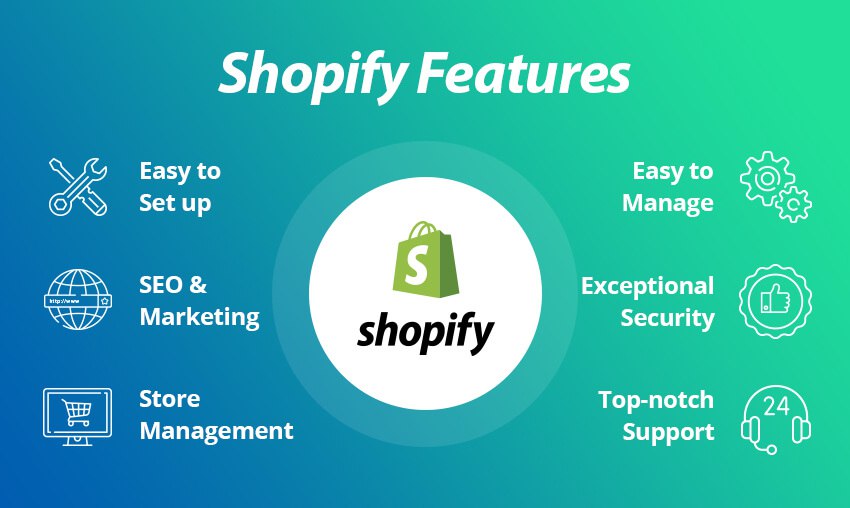
- Website Builder: Shopify provides built-in tools to create a customized and visually appealing online store. Even with no technical expertise, you can choose from a variety of themes, customize them, and create a unique look for your store.
- Shopping Cart: Shopify’s shopping cart is equipped to handle secure transactions from all major credit cards, PayPal, and more. It calculates taxes and shipping rates automatically, providing a seamless checkout experience for your customers.
- Store Management: Shopify makes inventory management simple, allowing you to track stock counts, and automatically stop selling products when inventory runs out.
- Marketing & SEO: Shopify provides built-in SEO features to help your store rank better in search results, driving more traffic to your site. It also offers marketing tools like product reviews, discount codes, and gift cards to build customer loyalty.
- Mobile Commerce Ready: Shopify stores are fully responsive, meaning they look and work well on any device. There’s also a free Shopify app, so you can manage your store on-the-go.
- Analytics: Shopify’s analytics tools let you gain insight into your store’s growth and consumer behavior. You can track sales, customer trends, and more.
- Product Management: Shopify allows you to add, list, edit, and organize products using a streamlined CMS interface. It supports variations in product color, size, and material, and lets you add multiple images for each product.
- Customer Support: Available 24/7, Shopify’s customer support team can be reached via email, live chat, or phone. They also offer a comprehensive FAQ and forum for additional support.
Who is Shopify for?
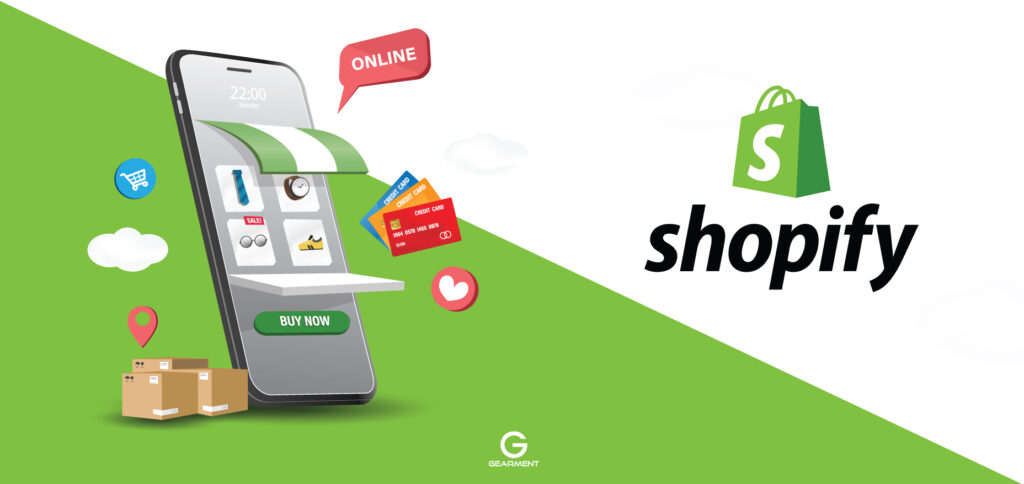
Shopify can streamline the process of setting up an online store, saving time and resources. Its in-built SEO and marketing tools enable these businesses to improve their online visibility, attract more customers, and boost sales. Moreover, with its user-friendly inventory management system, businesses can easily track stock counts and automate sales processes, enhancing efficiency and productivity. It can help a wide range of individuals and businesses such as:
- Entrepreneurs and startups looking to launch their first online store without any technical knowledge or skills.
- Small to medium-sized businesses seeking to expand their retail footprint by moving online or growing their existing online business.
- Artists, designers, and creators who want to sell their work or merchandise directly to their audience.
- Brick-and-mortar retailers who wish to establish an online presence and expand their customer base.
- Businesses with substantial inventory that need a comprehensive and easy-to-use inventory management system.
- Companies that want to take advantage of built-in marketing and SEO tools to boost their online visibility and sales.
Who is Shopify NOT for?
While Shopify boasts a plethora of benefits for many businesses and individuals, it may not be the ideal choice for everyone. If you are a business with a considerable size and highly complex operations, Shopify’s features might fall short. While it offers a wide range of integrations, it may not be able to fully support a business with unique or industry-specific needs that require highly specialized software or custom solutions. Businesses requiring complex B2B functionalities or seeking deep customization might find the platform limiting.
Similarly, for those who are highly tech-savvy and want complete control and flexibility over their website’s design and backend, Shopify might not be the perfect fit. While it offers a range of themes and customization options, it doesn’t offer the same degree of flexibility as open-source platforms. Thus, if you are an advanced user with specific needs for customization and integration, or if your business has more complex needs than what Shopify offers, you might want to consider more advanced or specialized e-commerce platforms.
Pricing plans
Shopify offers several pricing plans to cater to a broad spectrum of business needs. Each plan comes with a range of features suitable for both small and large-scale businesses.
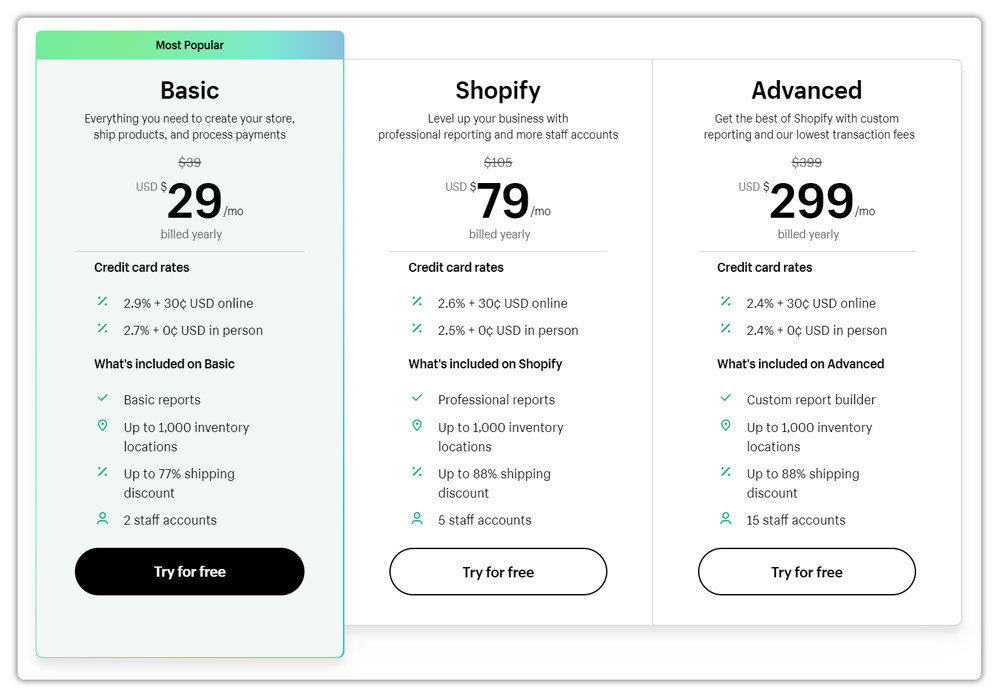
- Basic: Priced at $29/month, this Plan is ideal for new businesses or online businesses new to in-person selling. It offers all the basics required for starting a new online store, including unlimited products, 2 staff accounts, sales channels, 24/7 support, fraud analysis, manual order creation, discount codes, free SSL certificate, and abandoned cart recovery.
- Shopify: At $79/month, this Plan is perfect for growing businesses with 1 retail store. Apart from all the features in the Basic Plan, it also includes 5 staff accounts, gift cards creation, professional reports, and lower credit card rates.
- Advanced: Aimed at scaling businesses, this Plan costs $299/month. It includes 15 staff accounts, advanced report builder, third-party calculated shipping rates besides all features in the Shopify plan.
- Shopify Plus: Shopify Plus is an enterprise-grade solution for larger businesses or businesses looking for a more customizable solution. Pricing for this plan is custom and can be obtained by contacting Shopify directly. This plan includes advanced features and allows for greater customization.
It’s also important to note that all these plans come with a 14-day free trial, allowing businesses to test out the platform before making a financial commitment. Furthermore, while Shopify does not charge setup fees, transaction fees are applicable unless you use Shopify Payments as your payment gateway.
Pros and Cons
Like any service, Shopify has its strengths and weaknesses, which may significantly impact its suitability for different businesses. It is crucial to consider both the advantages and drawbacks before deciding if this platform aligns with your business needs and goals. Below, we present a balanced view of the pros and cons about this platform.
Pros of Using Shopify
- Ease of Use: Shopify is known for its user-friendly interface. Even with no technical skills, you can set up and run your online store efficiently.
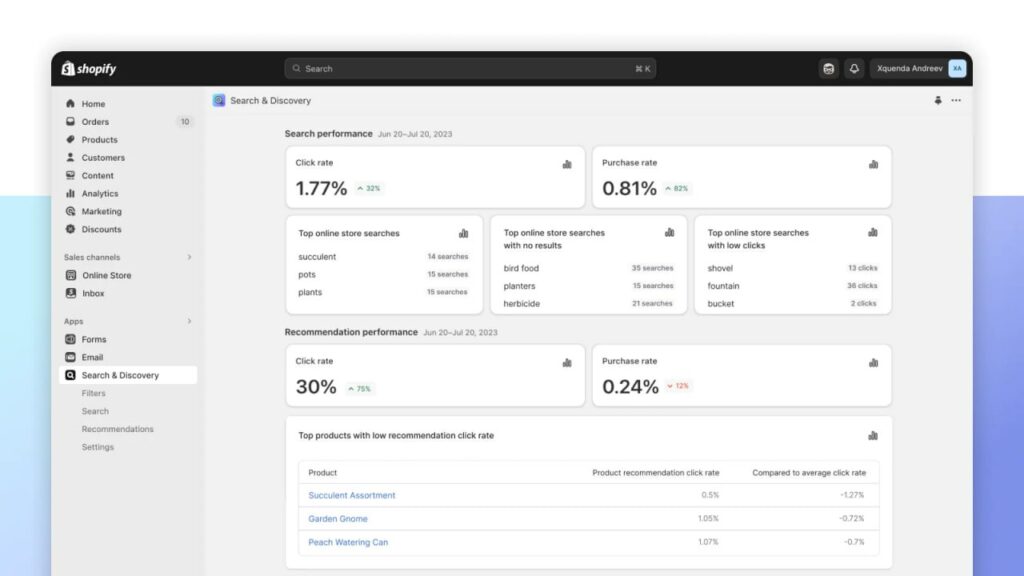
- Design Flexibility: Shopify offers a variety of themes to choose from, allowing you to present your store in a professional and appealing manner.
- Reliable Security: With Shopify, your online store is secure. They offer SSL certificates and PCI DSS compliance, ensuring safe transactions.
- 24/7 Customer Support: Shopify’s customer service is available around the clock to assist with any issues or questions you may have.
- SEO and Marketing Tools: Shopify’s built-in SEO and marketing tools help improve your store’s online visibility, driving more traffic and sales.
- Mobile Commerce Ready: Shopify stores are responsive, providing an excellent shopping experience on any device.
- In-built Payment Gateway: Shopify Payments, the platform’s built-in payment gateway, allows for seamless transactions, reducing the hassle of third-party integrations.
- Robust Analytics: Shopify’s analytics tools provide valuable insights into your store’s performance and customer behavior, helping you make informed decisions.
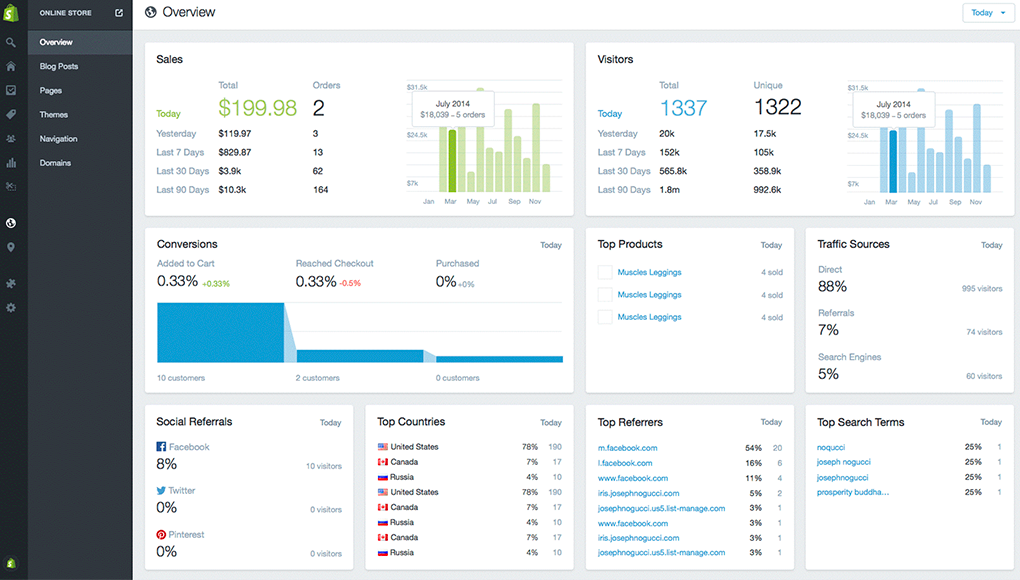
- App Integrations: Shopify’s App Store offers 1000+ apps for customization and added functionality, catering to your unique business needs.
- Scalability: Shopify can scale with your business. It offers plans suitable for everyone from small startups to large corporations.
Cons of Using
- Limitations in Customization: While the platform provides a wide array of themes and app integrations, it may not accommodate all the bespoke needs of your business. For those who crave full control over their site’s appearance and capabilities, the customization limitations may be a deterrent
- Transaction Fees: Unless you use Shopify Payments, it charges additional transaction fees. These fees can add up, especially for businesses with high sales volumes, and can cut into your profits.
- Complexities with Advanced Features: Some of Shopify’s advanced features may seem a bit complex, particularly to beginners or those less technically inclined. This might pose a challenge for businesses looking to leverage these features to the fullest.
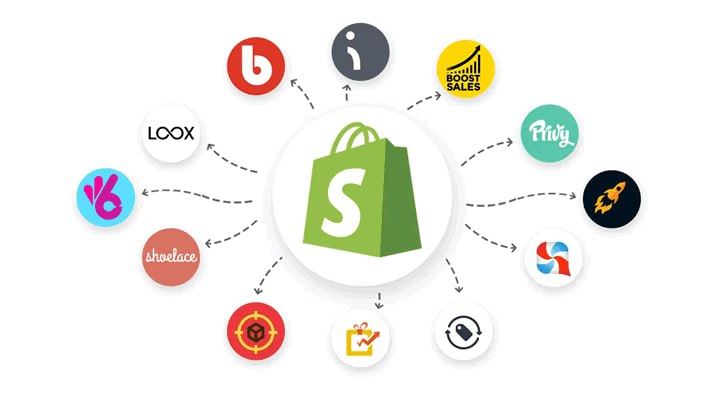
FAQ.
What types of payment methods does Shopify support?
Shopify supports a variety of payment methods. Customers can pay with credit cards, debit cards, PayPal, and various other alternatives. It also comes with its own payment gateway, Shopify Payments, which offers seamless integration and no transaction fees.
Can I use my own domain name with Shopify?
You can use your own domain name with Shopify. If you already have a domain, you can connect it to your Shopify store from your admin dashboard. Alternatively, you can also purchase a new domain directly through the system.
What types of products can I sell on Shopify?
You can sell a wide range of products on Shopify, including physical goods, digital products, services, and more. Shopify offers the flexibility to manage different types of product offerings efficiently.
Can I create a blog on my Shopify website?
Shopify has built-in blogging software that allows you to create a blog on your website. This can be a valuable tool for driving traffic to your site, sharing news, and engaging with your customers.
Is it possible to sell in multiple languages and currencies on Shopify?
The platform supports multiple languages and currencies, making it a great platform for businesses looking to sell internationally. You can set up your store in multiple languages and offer currency conversion for an easy shopping experience for your global customers.
Does Shopify offer an email hosting?
Shopify does not offer email hosting. However, you can set up email forwarding, which allows you to use your domain name in your email address, and the emails sent to that address will be forwarded to your existing email account.
Is there a limit to the number of products I can sell on Shopify?
There is no limit to the number of products you can sell on Shopify. All Pricing Plans include an unlimited number of products, which means you can expand your store as much as you need.

Author’s personal opinion
I have been using Shopify for my online store for over a year now, and I can’t imagine switching to any other platform. It has truly revolutionized the way I manage my online business. Its ease of use and wide range of features have made it easier than ever to set up and run my store. Shopify’s built-in SEO tools have significantly improved my store’s visibility online, driving more traffic and resulting in increased sales. Their 24/7 customer support is always there to help, making the whole experience stress-free. However, the transaction fees for not using Shopify Payments can be a bit of a setback. Overall, I would highly recommend Shopify to anyone looking to make the leap into e-commerce.
Final Verdict: Is Shopify Still Worth It in 2024?
Shopify proves itself to be a robust, user-friendly, and versatile e-commerce platform, suitable for both novices and experienced business owners. Its wide array of features, including a versatile app store, built-in SEO tools and advanced analytics, support businesses in creating and managing their online presence effectively. However, it is important to consider the limitations in customization and potential transaction fees when deciding if Shopify is the right fit for your specific needs. Overall, Shopify’s benefits appear to outweigh its downsides, as echoed in the reviews, making it a highly recommended choice for those venturing into e-commerce.
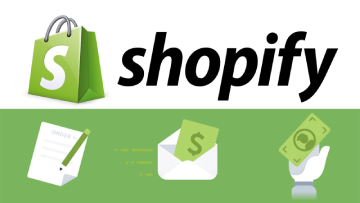

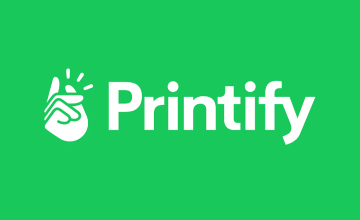
One response to “Shopify – Review”
As a beginner to e-commerce, I found Shopify to be an extremely intuitive platform. The user-friendly interface allowed me to set up my store quickly, and the range of themes gave my site a professional look. I especially appreciate the in-built payment gateway, which has simplified transactions immensely. However, I did find some of the advanced features a bit complex to navigate. Despite this, I am thoroughly impressed with Shopify’s capabilities and would definitely recommend it to others.